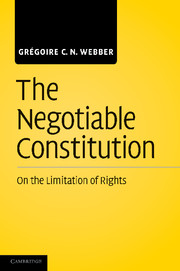Book contents
- Frontmatter
- Contents
- Preface and acknowledgements
- Introduction: on the limitation of rights
- 1 The constitution as activity
- 2 The received approach to the limitation of rights
- 3 Challenging the age of balancing
- 4 Constituting rights by limitation
- 5 The democratic activity of limiting rights
- 6 Justifying rights in a free and democratic society
- Conclusion
- Bibliography
- Index
6 - Justifying rights in a free and democratic society
Published online by Cambridge University Press: 30 March 2010
- Frontmatter
- Contents
- Preface and acknowledgements
- Introduction: on the limitation of rights
- 1 The constitution as activity
- 2 The received approach to the limitation of rights
- 3 Challenging the age of balancing
- 4 Constituting rights by limitation
- 5 The democratic activity of limiting rights
- 6 Justifying rights in a free and democratic society
- Conclusion
- Bibliography
- Index
Summary
Introduction
How are rights to be justified in a free and democratic society? On its face, this question may seem ill-posed; after all, under the received approach to the limitation of rights, it is the infringement or violation of rights, not rights themselves, that require justification. Yet, because rights are constituted by their limitation, the process of practical reasoning by which those limitations are identified must appeal to reasons, which, if valid and when taken together, can justify the specification of the right. The justificatory work is undertaken in identifying the scope and content of a right, and not its infringement or violation. Indeed, as reviewed in Chapter 4, rights, once delimited, are absolute and not subject to justifiable infringements or violations.
The question of a right's justification animates not only the theorist or scholar engaging in practical reasoning, but also the citizen and the citizen's representatives tasked with the responsibility for actualizing constitutional rights by limiting the underdeterminate guarantees set out in a charter of rights. ‘What reasons’, the theorist, scholar, citizen and legislator will ask, ‘are available in a free and democratic society for debating and for justifying the limitation of rights?’
The various limitation clauses of charters of rights provide some general indication of the genre of reasons available for justifying the limitation of rights.
- Type
- Chapter
- Information
- The Negotiable ConstitutionOn the Limitation of Rights, pp. 181 - 212Publisher: Cambridge University PressPrint publication year: 2009



